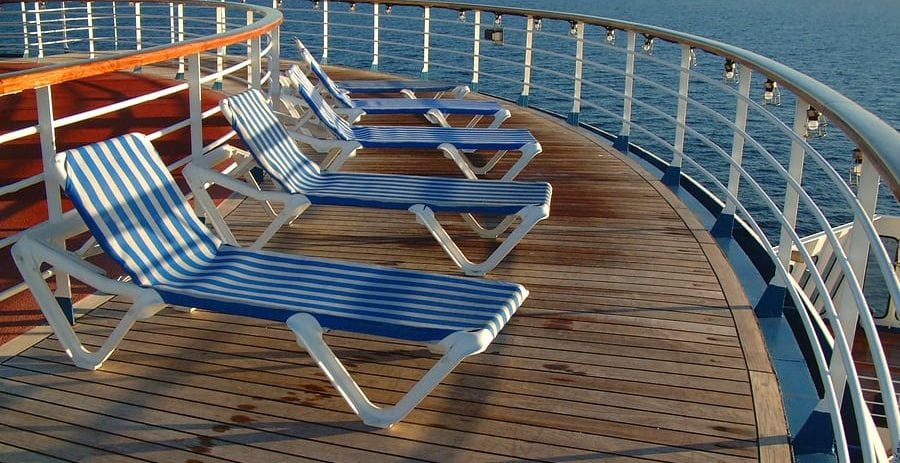Every year people everywhere board cruise ships and set sail for grand adventures and relaxing vacations. And while the majority of the trips go off without a hitch, cruise ship accidents can happen and there are some risks that cruise ship travelers need to know about.
Statistics on Cruise Ship Accidents and Injuries
During a period of 3 years a single cruise ship with an average of 700 passengers per trip was studied by the NCBI and they reported the following statistics from their on-ship medical team: “663 injuries (62.7% women) were reported aboard; 12.5% were classified as serious. The victims’ median age was 72 (range: 1-97) years. The incidence rate was 0.8 injuries per 1000 passenger-days. Most victims (65.3%) suffered injuries aboard, 3.6% on tenders, and 31.1% ashore. The most common accident locations aboard were cabins (20.1%) and bathrooms (13.4), and ashore, streets (29.6%) and buses (16.1%). Slips/trips/falls caused 44.8% of injuries aboard and 69.4% ashore (p < 0.001). The most frequently injured body part was the lower extremity (43.0%), and open wounds the most common injury type (41.6%). More wounds and fractures/dislocations occurred ashore than aboard (p < 0.05). Only 2% were hospitalized in port, while 5% were referred to specialists in local ports and returned to the ship. There were no helicopter evacuations or ship diversions” (NCBI).
Common Dangers Faced by Vacationers on a Cruise
Vacationers on a cruise are there to have a good time, but it is important to be aware of the risks that are there in order to take steps to avoid them. These are some of the most common cruise ship dangers that cause injuries, illnesses, or deaths among cruisers:
- Negligence- when the cruise ship staff or company representatives neglect proper upkeep and care or ignore warning signs of potential threats and leave them unaddressed
- Food poisoning- improper cooking and storage of food while on the ship can lead to illness, and severe cases of food poisoning can lead to hospitalization.
- Legionnaires’ Disease- this type of bacterial pneumonia is common on ships and confined spaces and can easily spread through air systems and in close contact exposure.
- Slip and fall accidents- these can occur on stairs, walkways, decks, and anywhere that can become slippery or that has something that can cause passengers to lose their footing.
- Swimming pool accidents, including drownings and diving board incidents
- Elevator and escalator accidents- malfunctioning of the systems or misuse by ship staff or visitors can lead to accidents, which can lead to serious injury in some cases.
- Toxic chemical injuries- exposure to cleaning supplies, fuel supplies, and other chemicals on board can injury visitors and cause injury.
- Recreational accidents- many cruises offer onshore activities and injuries can occur while participating in activities sponsored by the cruise line on or off the ship.
- Drowning- when one falls overboard or gets into the cruise ship pool without proper supervision or safety equipment downing can occur.
- Bedbug bites- unclean conditions and poor cleaning of bed linens and sleeping areas can lead to bed bug infestations which can cause painful bites and sores.
- Falling item injuries- unsecured objects can become dislodged during rough weather and fall from upper decks or overhead compartments and hit passengers.
- Cruise ship fires- when fires break out on the ship it can quickly spread and put the entire ship and all the passages and crew at risk.
- Wrongful death- if someone dies while on a cruise it might be due to poor medical care or not enough staff on hand to properly meet the need and lead to wrongful death claims.
- Rough weather- storms are a part of nature and most cruise lines do their best to avoid storms but if it cannot be avoided then rough weather can lead to injuries onboard.
- Violent crimes- though rare there is the chance of a violent crime, such as being attacked, molested, robbed, or otherwise assaulted by another passenger while on a cruise ship.
Keeping Yourself Safe While on a Cruise
One of the best ways to keep yourself safe on a cruise is to do your research and prepare ahead of time. Here are some things to look into and consider carefully before you leave port for your trip:
- Reputation of the Cruise Line- research the cruise line, check what their reputation is like, how many complaints they have, and if there have been any major instances reported from other passengers lately.
- Research Your Destination- do some research about where your cruise is heading and the various ports you will be stopping at; you need to know what the risks are for illness and disease at the places you are stopping.
- Prepare for What You Can: make sure you are in as good of health as possible before you leave on your cruise and bring all medical supplies you need including medicines and a basic first aid kit.
- Use Common Sense: be alert, make smart choices, and use common sense while on your cruise and you will be safer and have a better time.
Get Help For Cruise Ship Injuries
If you or a loved one has been injured during a cruise contact us today and we will review your case with you and help you determine if you have ground for legal action and can seek compensation for your illness or injury. Call today to get started!
